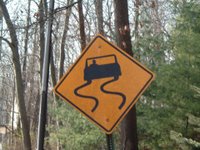Bending the Third Rail
Because We Should, We Can, We Do
Cost of the War in Iraq
(JavaScript Error)
Monday, March 13, 2006
9 Outta 5 Ain't Bad
 The economists Thomas Palley has a very interesting article out about the next recession:
The economists Thomas Palley has a very interesting article out about the next recession:This is not about predicting when the next recession will happen, but rather about its character. The when game is impossible. As Nobel Prize-winning economist Paul Samuelson once quipped, “Economists have correctly predicted nine of the last five recessions.” However, it is possible to anticipate future difficulties and proscribe possible remedies.In this article, Palley quite correctly points out that the Federal government is pretty low on bullets to fight any economic downturn. The typical tools used to fight recessions are lowered interest rates, more government spending, and tax decreases.
If you take a look at those tools, interest rates are already low, barely at the level of inflation. Money has been nearly "free" and is now with only a very small cost. Despite recent incremental increases, an awful lot of people who could refinance their homes, have. Businesses who had capital spending ambitions have already taken advantage of borrowing at the low rates. Unless the Fed greatly increases interest rates, this tool is largely played out for the time being.
In terms of government spending, the federal deficit is at record levels with tax cuts already largely to blame. It is economically and politically unwise to expand the federal deficit to a significant degree. Doing so could have the impact of making a recession deeper and longer lasting.
Read the whole article for an in-depth analysis of the situation. Palley does have some suggestion for how to approach the economy:
First, the Federal Reserve should be very careful about over-shooting with its rate hikes, and at this time it should take an inflation chill pill. Second, the current recovery has been extraordinarily weak, which should finally discredit the notion that tax cuts for the rich drive growth and job creation. Third, the speculative financial market paradigm—which has ruled the policy roost for twenty-five years—is out of gas. It is time for a new paradigm that links growth to rising wages, rather than to asset price boom-bust cycles.These are all very good suggestions, particularly the need for the Fed to tread carefully in the next 12 months. A heavy foot on the brakes is likely to send the U.S. economic vehicle into a skid off the side of the road. And with the expense of a foreign war, over-extended borrowing, and a shifting of the international center of economic power to China/India, the road is indeed quite slick and icy.
0 Comments:
About Me
- Name: Greyhair
- Location: Wine Country, California
I'm a very lucky person with every allergy known to man but still happy to be enjoying a wonderful life living in the best place in the world!
Blogroll
The Big PictureBillmon
Blah3.com
Born at the Crest of Empire
Eric Alterman
Eschaton
FireDogLake
Feingold's Blog
Dan Froomkin
The Huffington Post
Hullabaloo
The Illustrated Daily Scribble
Jesus General
Juan Cole
Matilda's Advice and Rants
Mia Culpa
MsJan Quilts
Needlenose
The Oil Drum
Political Animal
Political Wire
Spooks of the Ozarks
Talk About Corruption
TalkLeft
Think Progress
War and Peace
The Washington Note